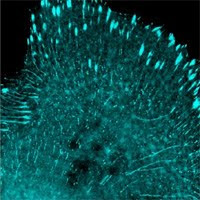Human
induced pluripotent stem cells provide a great route towards
personalized medicine and high accuracy drug screening. Allele Biotech has developed
the most efficient method of making human iPSCs by using enhanced
mRNAs, which have been adopted by leading pharmaceutical companies for
clinical trials. The effects from medium-supplemented mRNAs are robust
yet transient, and highly specific compared to both miRNAs (off-targets)
and small molecules (unknown targets). To repress cellular immune
response to introduced RNA molecules, viral protein B18R was previously
used during mRNA reprogramming.
B18R
is relatively expensive and inconvenient to use because it requires
pre-aliquoting and -80C storage. The protocol has recently been
dramatically improved at Allele through an NIDA-funded project. In our
latest reprogramming run, all we needed to do was to include mRNA
complex in the supplement during medium change for just a week without
the need of adding any other type of molecules (such as B18R, miRNA, or
chemicals) to help the mRNA mix,
unlike all other known mRNA-reprogramming protocols. This advancement
can make reprogramming human fibroblasts to footprint-free and xeno-free
iPSCs a routine experiment for any lab to perform.
Human
R-iPSCs were created without the need of B18R, dramatically reduced the
cost and inconvenience. Shown is a newly formed iPSC colony.



